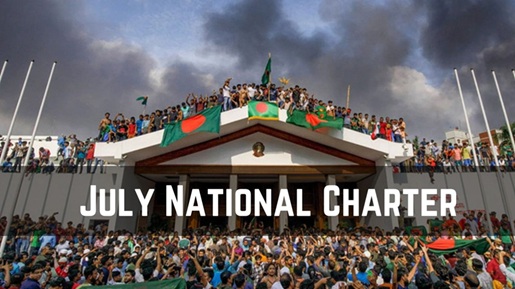(Preliminary Examination: Contemporary International Events)
(Mains Examination, General Studies Paper 2: Impact of Policies and Politics of Developed and Developing Countries on India's Interests; Overseas Indians.) |
Context
On October 17, 2025, Bangladesh's interim government head and Nobel laureate Dr. Muhammad Yunus signed the July Charter, calling it "the birth of a new Bangladesh." The charter was drafted by the National Consensus Commission, signed by 25 political parties. However, the student-led National Citizens Party (NCP) boycotted it, calling it "signed without legal basis."

What is the July Charter ?
- This charter is a political document designed to restore democracy and institutional reform in Bangladesh.
- It includes over 80 reform proposals focused on bringing about changes in areas such as governance, judiciary, education, and administration.
- Interim Prime Minister Dr. Yunus said, “This is the birth of a new Bangladesh, where the will of the people will be supreme.”
Historical Background
- The student and mass movement in July 2024 played a major role in the ouster of then-Prime Minister Sheikh Hasina's government.
- This movement, known as the "July Uprising," resulted in the injury and death of many protesters.
- Since then, an interim government has been formed in the country, led by Dr. Yunus.
- The Charter aims to create a stable democratic framework after this turmoil.
Key Provisions
- Political Reforms:
- Ending the one-party system that has prevailed since 1975 and restoring multi-party democracy.
- Emphasis on reviewing the controversial elections of 2014, 2018, and 2024 and on electoral reforms.
- Judiciary and Administration:
- Pledge to free the judiciary, police, and administration from political influence.
- Plan to curb corruption and nepotism.
- Social Justice and Human Rights:
- Providing legal protection and rehabilitation to participants of the July Movement (July Fighters).
- Formation of an independent inquiry committee into human rights violations.
- Reassessment of History and Democratic Legacy:
- The Charter respectfully revisits historical movements such as the Language Movement (1952), the Freedom Struggle (1971), and the People's Uprising (1969).
- Seven-Point Commitment:
- Loyalty to the will of the people
- Transparent governance
- Electoral fairness
- Judicial independence
- Protection of human rights
- Youth participation
- Governance based on national consensus
Impact
Political Impact
- The Charter initiated a process of democratic renaissance in the country.
- Opposition parties such as the BNP and Jamaat-e-Islami gained legitimacy in re-entering political activity.
Social Impact
- Honoring the "July Fighters" enhanced a sense of justice and respect in society.
- Public confidence in the transition to governance was fostered.
Administrative Impact
- Demands for transparency and accountability in the administration and police strengthened.
- Bangladesh began to be seen internationally as an example of democratic reforms.
Concerns and Challenges
- Lack of legal legitimacy: The NCP alleges that the Charter's constitutional or legal basis is unclear.
- Political divisions: Protests by student organizations and youth continue.
- Violent protests: Clashes broke out between protesters and police during the charter signing ceremony.
- Absence of supporters of the former government: The Awami League was completely excluded from discussions, raising questions about national unity.
- Lack of institutional stability: The implementation of reforms remains in doubt due to the limited legitimacy of the interim government.
Way forward
- Ensuring constitutional basis: The Charter must be ratified by Parliament and the judiciary.
- Involving all parties: All parties, including the Awami League, must be included in the dialogue process.
- Increasing youth participation: Student organizations like the NCP must be included in the reform process.
- Guaranteeing security and peace: Emphasize dialogue-based solutions instead of protests.
- International cooperation: Seek support from the United Nations and other partner countries to strengthen democratic institutions.
Conclusion
The July Charter marks a new chapter in Bangladesh's political history, attempting to revive democracy, accountability, and civic participation.
While the challenges remain numerous, if the Charter receives legal and social support, it could truly serve as the foundation for a "new Bangladesh"; a country rooted in the spirit of democracy and the aspirations of the people.

 Contact Us
Contact Us  New Batch : 9555124124/ 7428085757
New Batch : 9555124124/ 7428085757  Tech Support : 9555124124/ 7428085757
Tech Support : 9555124124/ 7428085757








